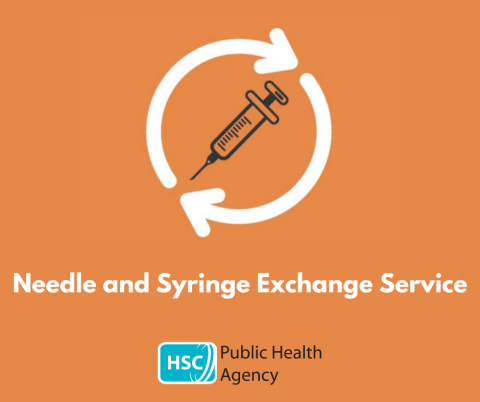Needle exchanges help stop the spread of infection

New figures from the Public Health Agency (PHA) show a total of 31,851 transactions were made by the Needle and Syringe Exchange Service (NSES) across Northern Ireland in 2023.
Helping to stop the spread of infection from potential drug-related litter and sharing of injecting equipment, the NSES also provides those who use the service with direct contact with a health professional who can help them engage with additional services they may require.
Anyone who injects substances can use a needle exchange service to access clean equipment, and this includes people who inject substances such as performance enhancing steroids, tanning agents, stimulants and opioids.
Of the substances reported to the NSES, heroin/morphine was reported most frequently (11,201), with cocaine powder (9,265) and anabolic steroids (6,996) the next most reported.
Kevin Bailey, Regional Lead for Drugs and Alcohol at the PHA, said: “Sharing or reusing injecting equipment can increase the risk of bloodborne viruses so needle exchanges have an important role to play in helping to protect not only those using the service, but also the wider community more generally by providing clean equipment for people who inject substances.
“NSES are based in areas where there is an existing pattern of people who inject, but the service benefits the entire community by helping to lower the risk of diseases such as HIV and Hepatitis B and C within the wider population.
“Providing services locally is vital, as people who inject substances are often vulnerable, may be in poor health, dealing with complex social issues and without local access to sterile equipment and advice. Needle exchanges are particularly valuable for engaging these people, because it may be the only service they are willing to use and provides opportunities to signpost them to additional support and information.”
Community pharmacies continue to complete most of the overall transactions of the NSES at 50.4% of the total in 2023, followed by the community-based providers completing 46% of the total transactions.
In 2022, the PHA fully implemented a new online database to record needle exchange activity alongside anonymous, non-identifiable client data. This database is called the Neo360 Harm Reduction Information System and became fully operational across all NSES sites on 1 December 2022.
Kevin Bailey continued: “With the introduction of the new online Neo360 Harm Reduction Information System, live data can be accessed, immediately, which in turn will allow for a timely and effective public health response to any trends we identify.
“For the first time, Neo360 provides the client the opportunity to report how they administer the substance used, which is additional information we can capture and respond to appropriately. For example, as part of our strategy to promote harm reduction, staff within needle exchange sites are encouraged to dispense foils which will support smoking, thus, reducing the added harm that is caused through injecting.”
The full report NSES Report can be found at www.pha.site/NeedleExchangeReports
If you or someone you know is affected by drug and/or alcohol misuse, a range of support services in your local area can be found on www.DrugsAndAlcoholNI.info
Notes to editors
- The Needle and Syringe Exchange Service (NSES) is vital to the health and wellbeing of the entire community, helping to reduce the potential of drug-related litter, lowering the risk of HIV and Hepatitis B and C within the wider population, and putting those who use the service in direct contact with a health professional who can help them in engaging with treatment services to address their substance use.
- Thirty-five needle exchange services are commissioned across Northern Ireland based in areas where there is an existing pattern of people who inject, but help protect everyone in the community. Anyone who injects substances can use a needle exchange service, and this includes people who inject opioids, steroids, tanning agents or stimulants.
- Of the total visits to the NSES, 29 different substances were reported. This includes those selecting the ‘unknown’ category which was 7,646 (19%). Heroin/morphine (11,201) was reported most frequently among needle exchange clients. Cocaine powder (9,265) and anabolic steroids (6,996) are the second and third most frequently reported substances, respectively, across Northern Ireland.
- The reported usage of cocaine powder has continued to increase throughout the year. In the final quarter (October to December 2023) cocaine powder was the most reported substance in the Belfast Trust area for the first time within needle exchange.
- Although heroin/ morphine was reported most frequently during transactions, the number of unique individuals using anabolic steroids by far exceeded the number those using heroin/ morphine or cocaine powder.
- 6,353 clients registered on Neo360 to use the needle exchange service. More males use the NSES service for the last number of years. However, there has been a gradual increase in the number of females accessing the service.
- The most common age category for those using NSES is 35-39 years, followed by those aged 30-34 years.
- Seven new NSES exchanges have opened over the reporting period 1 January 2023 – 31 December 2023.
- The highest number of overall transactions continue took place in the Belfast HSC Trust area (68.5%) and the lowest percentage of transactions continue to take place in the Southern HSC Trust area (3.9%). During 2023, the Southern HSC Trust area and opened a total of four new exchanges to improve coverage in this Trust area.
